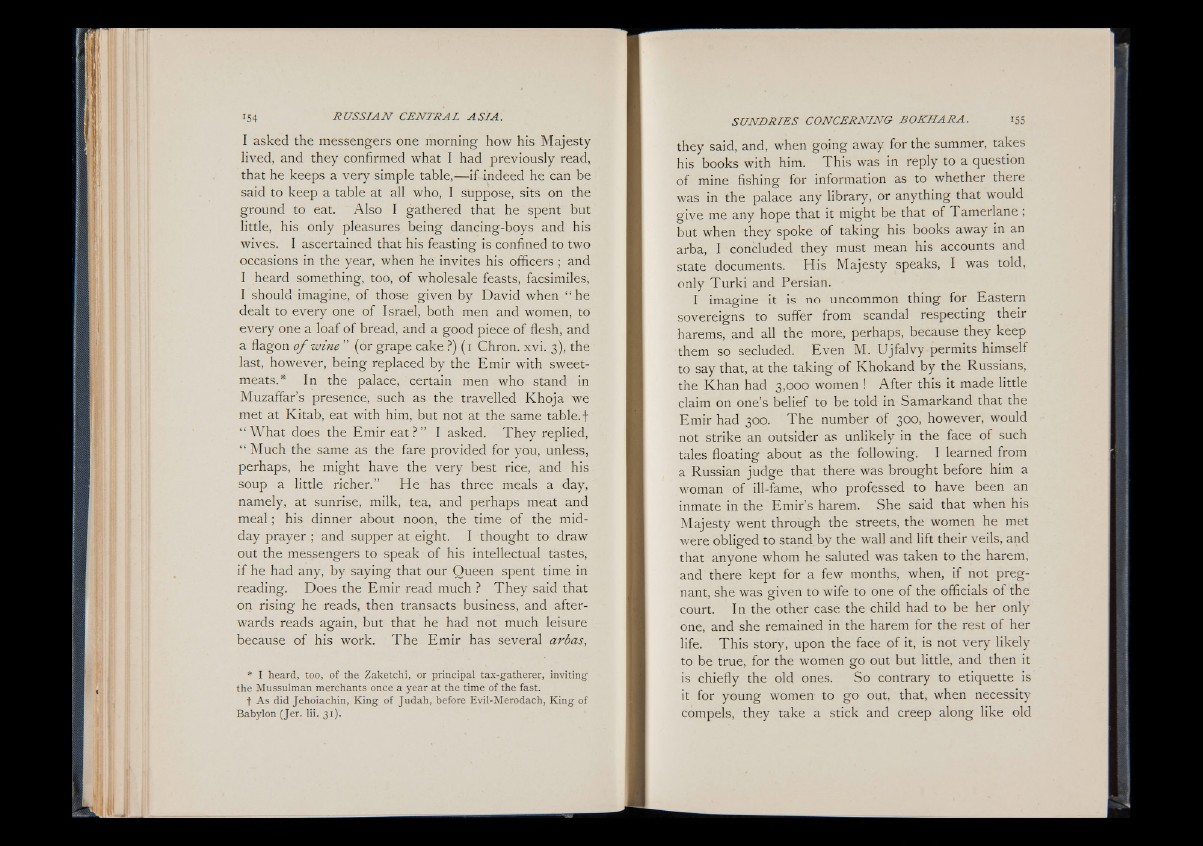
I asked the messengers one morning how his Majesty
lived, and they confirmed what I had previously read,
that he keeps a very simple table,— if indeed he can be
said to keep a table at all who, I suppose, sits on the
ground to eat. Also I gathered that he spent but
little, his only pleasures being dancing-boys and his
wives. I ascertained that his feasting is confined to two
occasions in the year, when he invites his officers; and
I heard something, too, of wholesale feasts, facsimiles,
I should imagine, of those given by David when “ he
dealt to every one of Israel, both men and women, to
every one a loaf of bread, and a good piece of flesh, and
a flagon o f wine ” (or grape cake ?) (i Chron. xvi. 3), the
last, however, being replaced by the Emir with sweetmeats.*
In the palace, certain men who stand in
Muzaffar’s presence, such as the travelled Khoja We
met at Kitab, eat with him, but not at the same table, f
“ What does the Emir eat ? ” I asked. They replied,
“ Much the same as the fare provided for you, unless,
perhaps, he might have the very best rice, and his
soup a little richer.” He has three meals a day,
namely, at sunrise, milk, tea, and perhaps meat and
meal; his dinner about noon, the time of the midday
prayer ; and supper at eight. I thought to draw
out the messengers to speak of his intellectual tastes,
if he had any, by saying that our Queen spent time in
reading. Does the Emir read much ? T hey said that
on rising he reads, then transacts business, and afterwards
reads again, but that he had not much leisure
because o f his work. The Emir has several arbas,
* I heard, too, of the Zaketchi, or principal tax-gatherer, inviting
the Mussulman merchants once a year at the time of the fast.
f As did Jehoiachin, King of Judah, before Evil-Merodach, King of
Babylon (Jer. lii. 31).
they said, and, when gojng away for the summer, takes
his books with him. This was in reply to a question
of mine fishing for information as to whether there
was in the palace any library, or anything that would
give me any hope that it might be that of Tamerlane;
but when they spoke of taking his books away in an
arba, I concluded they must mean his accounts and
state documents. His Majesty speaks, I was told,
only Turki and Persian.
I imagine it is no uncommon thing for Eastern
sovereigns to suffer from scandal respecting their
harems, and all the more, perhaps, because they keep
them so secluded. Even M. Ujfalvy permits himself
to say that, at the taking of Khokand by the Russians,
the Khan had 3,000 women ! After this it made little
claim on one’s belief to be told in Samarkand that the
Emir had 300. The number of 300, however, would
not strike an outsider as unlikely in the face of such
tales floating about as the following. I learned from
a Russian judge that there was brought before him a
woman of ill-fame, who professed to have been an
inmate in the Emir’s harem. She said that when his
Majesty went through the streets, the women he met
were obliged to stand, by the wall and lift their veils, and
that anyone whom he saluted was taken to the harem,
and there kept for a few months, when, if not pregnant,
she was given to wife to one of the officials of the
court. In the other case the child had to be her only
one, and she remained in the harem for the rest o f her
life. This story, upon the face of it, is not very likely
to be true, for the women go out but little, and then it
is chiefly the old ones. So contrary to etiquette is
it for young women to go out, that, when necessity
compels, they take a stick and creep along like old